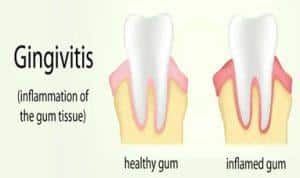When you have gingivitis, you are likely to experience soreness in your gums.
There are several possible causes of this condition, as well as treatments that can help.
Hopefully, this article can provide you with a few helpful tips on how to identify and treat it early.
Gingivitis is a condition that affects the gums. It can lead to periodontal disease and tooth loss. The condition usually occurs when plaque forms on the teeth, which is a buildup of food and bacteria.
It is important to see your dentist regularly. A regular dental check-up can catch the condition at an early stage and help prevent future damage.
Gingivitis Symptoms
Some of the symptoms include swollen, red, puffy, bleeding gums and bad breath. You should have a checkup with your dentist if you notice any of these symptoms.
Causes
Gingivitis is a common, mild gum disease usually caused by plaque buildup, which is a biofilm made up of bacteria that release enzymes called collagenases. When plaque accumulates around your teeth, it can erode the gum tissue and damage the gums. In some cases, it can begin to shift and loosen teeth. If left untreated, it can worsen and lead to infection and tooth loss.
Other possible contributing causes of gingivitis
- Poor oral care habits
- Smoking or chewing tobacco
- Older age
- Dry mouth
- Poor nutrition, including vitamin C deficiency
- Dental restorations that don’t fit properly or crooked teeth that are difficult to clean
- In rare cases, gingivitis may be caused by viral or fungal infections
- Medications such as angina drugs can also cause abnormal growth of the gums.
Untreated gingivitis can lead to periodontitis within 12 to 18 months. This is a more serious disease that can result in loss of teeth and tissue in the gums.
Luckily, gingivitis is easily treatable with proper dental care.
Gingivitis Treatment
To prevent gum disease, it is important to brush your teeth twice a day and floss regularly. This helps remove plaque and tartar from your teeth.
Regular visits to the dentist and hygienist for professional cleanings are also important.
Your dentist will perform a thorough examination of your mouth for signs of gingivitis and check your teeth and gums for inflammation or recession.
They will use a small metal tool called a periodontal probe to measure the depth of the gum pockets, this procedure is called periodontal charting. This is done to determine the depth of gum pockets. Depending on the severity and stage of gingivitis, your dentist might recommend water irrigation.
In some cases, your dentist may refer you to a periodontist. A periodontist specializes in diseases of the gums and bones that support your teeth. They can help treat gingivitis and prevent further complications.
Seeing your dentist as soon as you notice any symptoms of gingivitis will allow you to treat the condition at an early stage. You may also ease the symptoms at home by using an antiseptic mouthwash and saltwater rinse.
If you experience moderate pain, medications such as Tylenol, Ibuprofen and aspirin can be helpful in reducing the inflammation and pain associated with gingivitis.
If the condition is not treated, it can become serious, as the infection can travel into the bloodstream. This can lead to extreme complications, and even coma or death.
Your dentist can prescribe a corticosteroid paste or antibiotics to fight the infection and reduce inflammation. They may also recommend a medicated mouthwash or a vitamin C supplement.
You may be referred to a periodontist specialist to treat your symptoms if they are severe.
Prevention
If you experience any early sign of gingivitis, you should visit your dentist as soon as possible. Your dentist will check your teeth and gums and give you recommendations on what you should do to prevent the symptoms from becoming worse.
To treat early symptoms and prevent gingivitis, you should brush and floss your teeth regularly. You can also apply a natural mouthwash twice a day.
Using an electric toothbrush and water flosser can help you eliminate plaque. An electric toothbrush has soft bristles, which make it easier to clean your teeth. You may also use an antibacterial mouthwash to combat bacteria and keep your mouth healthy.
Smoking can also cause gingivitis. You should also avoid chewing tobacco. Keeping a good diet with foods especially high in vitamin c can also help you to prevent gingivitis. Avoid excessive sugar and drink plenty of water.
Call to schedule your next appointment with Dr. Huang or Dr. Chiu at Casa Dental.








 REQUEST AN APPOINTMENT
REQUEST AN APPOINTMENT